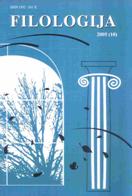Lietuvos rusų komunikatyvinis elgesys asociaciniame eksperimente
Communicative Behaviour of the Russians Living in Lithuania in the Associative Experiment
Author(s): Elena AkimovaSubject(s): Language and Literature Studies
Published by: VšĮ Šiaulių universiteto leidykla
Keywords: associative experiment; associative dictionary; communicative behaviour; predication
Summary/Abstract: In the article the results of the processing of the 500 questionnaires of the “Associative Dictionary of the Russians Living in Lithuania” are being discussed (E. Akimova 2003: manuscript variant). 105 words culturally significant for our respondents have been used as the stimuli. In the experiment participated students of the Lithuanian higher schools for whom Russian is the native language, the analysis of the material gives the possibility to draw the following conclusions which allow to speak about the typical characteristics of the bearers of the Russian language living in Lithuania as well as about the types of the communicative behaviour of the generalized, constructed in the associative experiment linguistic personality. All the variety of the relations which have been found by us between words and word forms in the pairs S→R (stimulus → reaction) and R←S(reaction ← stimulus) could be generalized as one concept of predication, i.e. the organization of all the associative – verbal net is based an the principle af predication. In the respondents’ answers 4 types of syntaxemes have been distinguished: predication, nomination, location, evaluation. The major part of word combinations S→R are related syntagmatically (≈ 80 – 75 %) related paradigmatically. Besides the questionnaires with the distinctly expressed tactics of predication, the answers have been encountered containing 2 – 3 reactions for one stimulus. Some respondents perceived the direct relation between the stimulus and reaction, therefore the preceding stimulus changed into reaction for the subsequent one. The non – motivated answers have also been abserved, i.e. such answers which, in our opinion, do not have logical relation. Sometimes the respondents did not answer the question, however, it is impossible to discover any consistency in the refusal. In the “Associative Dictionary of the Russians Living in Lithuania” individual peculiarities of the communicative behaviour are latent, however, they are clearly seen in the analysis of every questionnaire. As the respondents have indicated their sex at the beginning of the questionnaire, this information helped us to reveal the specific features of the “feminine” and “masculine” answers, their intellectual level.
Journal: Filologija
- Issue Year: 2005
- Issue No: 10
- Page Range: 5-12
- Page Count: 8
- Language: Lithuanian

